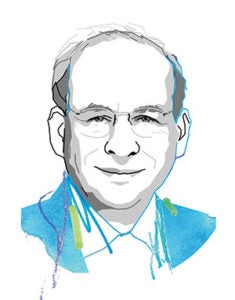
700 & Change
President's Note

Winter 2018
By David Leebron
Rick Smalley, one of Rice’s Nobel Prize winners, famously said, “Be a scientist, save the world.” One of the absolute privileges of being president of a research university of Rice’s quality is spending time with our faculty. They are an extraordinarily passionate and brilliant group striving to advance knowledge and contribute to the betterment of our world.
In December, I had the wonderful experience of attending the presentations in Chicago by the four finalists for the MacArthur Foundation’s 100&Change competition. The finalists included our own Rebecca Richards-Kortum. Rebecca and her global team developed NEST360°, a collaborative project based on work by Rice 360°, which will develop 17 low-cost technologies to provide neonatal treatment to babies in Africa and eventually other low-resource environments. They project that they can save 500,000 babies per year in Africa at a cost of just $1.48 per birth. Although NEST360° didn’t win the $100 million prize, they were given a $15 million grant by the foundation, and we’re confident the team will raise more.
Our scientists — and I am using that term here broadly to include researchers in every field — work to discover new knowledge and improve the world. That is their motivation, and it is our mission. It’s based on three simple propositions that ought to be incontrovertible and uncontroversial: research matters, facts matter and knowledge matters.
Ultimately, we seek to make use of research, facts and knowledge to better understand our world, to better predict the future, and to use knowledge and discoveries to make that future better. As I said in my inaugural address at Rice more than 13 years ago, “Our universities exist because of a faith that knowledge will lead to enlightened understanding, which in turn will lead to a betterment of our world and the people who inhabit it. That sense of the unlimited potential of a great university to contribute to human progress is the faith and vision upon which we are founded.”
Research universities matter not only because we identify problems in need of solutions and sometimes design those solutions, but also because we identify things we don’t know and wish to learn, and that leads to fundamental advances. Rick Smalley, Bob Curl ’54, Harold Kroto and others weren’t seeking to lay the foundation of nanotechnology three decades ago; they were simply seeking to understand some observations that couldn’t yet be explained, and through that curiosity-driven research, they discovered new things. Namely, the discovery of Carbon-60 and its structure took them in new directions to further findings and to establish an entirely new way of understanding and synthesizing materials.
I have written before of my own work studying 19th-century chemistry and the emergence of a theory on how atoms in molecules in space are physically arranged. The very question of whether we could know the physical arrangements of things we could not see was controversial, but new theories and new observations led to vastly increased capabilities of using chemistry to human benefit.
Such theories are often controversial at the beginning, and most turn out to be wrong in some respect. Isaac Newton’s discoveries were in some sense later shown to be wrong as our understanding of physics advanced, just as the powerful understanding of molecular structure in the late 19th century also turned out to be wrong. But as Isaac Asimov responded to someone who claimed that all theories are eventually proven wrong: “When people thought the Earth was flat, they were wrong. When people thought the Earth was spherical, they were wrong. But if you think that thinking the Earth is spherical is just as wrong as thinking the Earth is flat, then your view is wronger than both of them put together.” In sum, to discover truth and knowledge, we must dare to be wrong.
More than 72 years ago, Vannevar Bush submitted his report to President Harry S. Truman outlining the need for a continuing and future partnership of the government and universities to support basic research. He titled the report “Science, the Endless Frontier.” As we advance knowledge, the frontier advances as well. The more we discover and learn, the more we see our ignorance, and the more we are able to identify error in truths previously discovered. As President John F. Kennedy said in his 1962 speech at Rice Stadium, “The greater our knowledge increases, the greater our ignorance unfolds.”
In this issue you will read about what drives and concerns six accomplished researchers, all stars in their respective fields. They encompass fields ranging from the sociological study of health to computer science and the physics of biology to educational effectiveness. They include three immigrants. Each of them is a visionary; each is dedicated to advancing the frontier of knowledge. Together with some 700 others, they are changing our world by pushing the frontiers of knowledge and inspiring our students.
